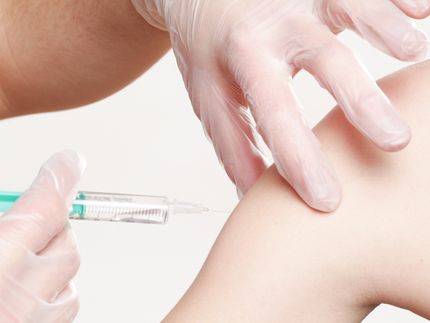Data from historic phase IIb clinical trial for tuberculosis vaccine candidate MVA85A
Data from a Phase IIb clinical trial evaluating the safety and efficacy of MVA85A in preventing tuberculosis (TB) in infants. MVA85A is a TB vaccine candidate designed to boost immune responses already primed by the Bacille Calmette-Guérin (BCG) vaccine, the currently licensed and widely used TB vaccine.
Data show that a single dose of MVA85A is not sufficient to confer statistically significant protection against TB disease or infection in infants who had been vaccinated at birth with BCG. There were 32 cases of TB disease in the infants that received BCG + MVA85A compared with 39 cases of disease among those receiving BCG + placebo. Non-significant vaccine efficacy was measured at 17.3% (95% CI -31.9% to 48.2%) at study completion. The vaccine candidate also did not provide statistically significant protection from infection with Mycobacterium tuberculosis, the bacterium that causes TB, which was a secondary efficacy endpoint.
“Although the results of this first efficacy trial of a new TB vaccine are not what we had hoped for, further analysis of the data should reveal a great deal about how the body’s immune system protects against TB and what is necessary to develop an effective vaccine,” said senior author Prof. Helen McShane, a Wellcome Trust Senior Clinical Research Fellow at the University of Oxford and the original developer of the vaccine. “The results from this study should let us know far more about the type and level of immune response required, and that will boost future efforts to develop an effective TB vaccine by Oxford and other researchers throughout the world. The difficulty of this task is one reason why there has not been a new TB vaccine since BCG was developed more than 90 years ago, but one is still urgently needed and I’m not about to give up now.”
MVA85A is the first novel, preventive TB vaccine candidate since BCG to complete a Phase IIb safety and efficacy study.
The study was successful in that the vaccine was well tolerated, there was no evidence of any harm to the trial participants, and it gave a clear answer. This study also showed it is possible to conduct a large infant efficacy clinical trial in an area of high TB incidence with robust endpoints for detecting disease, something that is expected to greatly benefit future testing of TB vaccine candidates.
Funding for this clinical trial was provided by Aeras, a nonprofit biotech with a social mission to develop TB vaccines, The Wellcome Trust, and the Oxford-Emergent Tuberculosis Consortium (OETC), a joint venture between the University of Oxford and Emergent BioSolutions. This Phase IIb study was sponsored by Aeras and conducted by the University of Cape Town’s South African Tuberculosis Vaccine Initiative (SATVI). The vaccine was originally developed and investigated by the University of Oxford.
It is anticipated that further analysis of the data and samples collected will be conducted for information that may be helpful for the development of new vaccine candidates. For example, blood samples will be used to identify markers that can predict whether a child will develop TB disease in the future. These biomarkers are termed “correlates of risk” and may substantially aid the development of new vaccines and contribute to different trial designs in the future.
Most read news
Organizations
Other news from the department research and development

Get the life science industry in your inbox
By submitting this form you agree that LUMITOS AG will send you the newsletter(s) selected above by email. Your data will not be passed on to third parties. Your data will be stored and processed in accordance with our data protection regulations. LUMITOS may contact you by email for the purpose of advertising or market and opinion surveys. You can revoke your consent at any time without giving reasons to LUMITOS AG, Ernst-Augustin-Str. 2, 12489 Berlin, Germany or by e-mail at revoke@lumitos.com with effect for the future. In addition, each email contains a link to unsubscribe from the corresponding newsletter.





















































